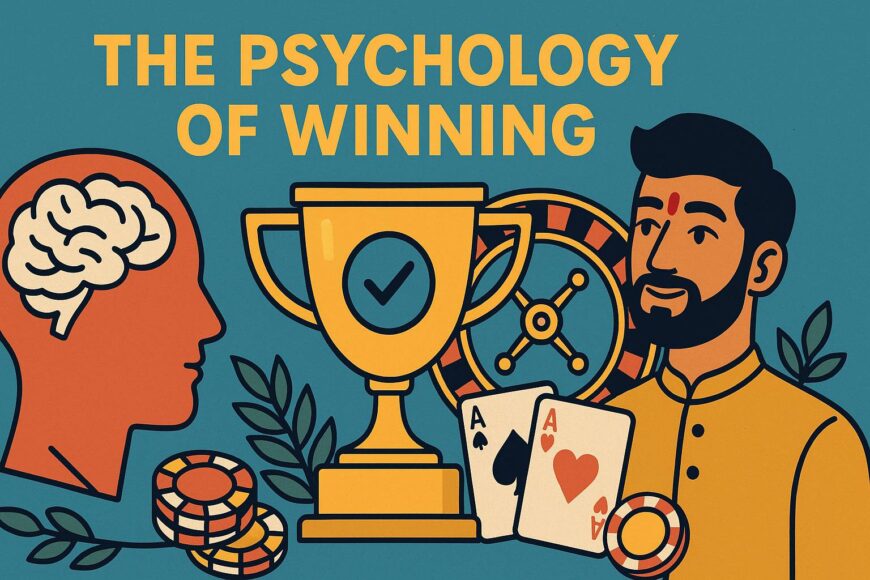The Rise of iGaming and the Psychology of Winning

The iGaming industry in India has grown at an incredible pace, with millions of players now engaging in online casinos, poker, fantasy sports, and live dealer games. While most discussions focus on strategy, skill, or pure luck, the deeper psychological side of winning is often overlooked. Winning doesn’t just bring financial rewards; it also influences how players feel, think, and make future decisions. Understanding the psychology of winning helps Indian players recognize the mental triggers that keep them coming back. In this article, we’ll explore the cultural factors, behavioral patterns, and emotional responses that shape the experience of victory in iGaming and why awareness is essential for responsible play.
Why Winning Feels Different in Indian iGaming
Winning in iGaming releases dopamine, the chemical that creates excitement and joy. This happens for every player, but in India, cultural and social dynamics give it a unique flavor. Gaming is often more than just personal—it’s about community. Many Indian players celebrate their wins with friends and family, sharing results on WhatsApp groups or social media. This sense of collective celebration strengthens the emotional high and creates stronger memories, making victories feel even more rewarding. The mix of social pride and personal achievement makes Indian iGaming wins stand out compared to other markets, motivating players to return and relive that powerful experience time and time again.
The Role of Luck and Tradition
India’s relationship with games of chance stretches back centuries, with classics like Teen Patti and Andar Bahar tied to festivals such as Diwali. This cultural connection shapes how players perceive winning. For many, a victory is not only luck but also destiny or fate unfolding. This belief can create confidence and positivity but also carries a risk—players may feel encouraged to stake more, believing fortune is on their side. Understanding this mindset is crucial for maintaining balance. By recognizing the role of cultural tradition in decision-making, Indian players can celebrate their wins without falling into emotional or impulsive choices that may harm their long-term experience in iGaming.
The “Near-Miss Effect” in Online Casinos
Among the strongest psychological triggers in iGaming is the near-miss effect, where players come close to winning but fall just short. Slots, roulette, and card games are designed with suspenseful outcomes that make a near-miss feel almost as thrilling as an actual win. In India, where online slots are becoming increasingly popular, these near-wins can create a powerful urge to continue playing. However, it’s vital to recognize that “almost winning” is still a loss, no matter how exciting it feels. Responsible players learn to see through this illusion, staying disciplined with their choices. By understanding the near-miss effect, Indian iGaming enthusiasts can enjoy the thrill while maintaining control over their gameplay.
How Winning Shapes Player Behavior
Winning in iGaming doesn’t just deliver a short burst of excitement—it also influences how players think and behave in future sessions. For Indian players, victories often create psychological shifts that can lead to new betting patterns or riskier decisions. Two of the most common responses are:
- + The Hot-Hand Fallacy: After a win, players may believe they are “on a roll” and that more wins are inevitable, even though every game outcome remains random.
- + The House Money Effect: Players often take greater risks with recently won money, treating it as a bonus rather than their own funds.
Recognizing these patterns helps players stay disciplined, ensuring they enjoy the thrill of winning without losing control.
Social Proof and Community Influence
In India, community and peer influence shape much of the iGaming experience. When players see others winning—through livestreams, leaderboards, social media posts, or online casino forums—it creates a strong sense of social proof. This psychological effect makes individuals believe that if others are winning, they too can achieve the same results. The excitement of shared success builds confidence and often encourages more participation. However, this perception can be misleading, since public wins are celebrated widely while personal losses often go unnoticed. Smart Indian players understand that every spin, hand, or bet is an independent event. By keeping perspective, they can enjoy the thrill of community influence without letting it distort their expectations or decisions.
Responsible Winning: Keeping Psychology in Check
The excitement of winning in iGaming can easily influence emotions and decisions, which is why responsible play is so important. For Indian players, balancing the thrill of victory with self-control ensures the experience remains enjoyable and safe. Responsible winning means celebrating success without letting it drive reckless bets or endless play sessions. Practical habits can make all the difference:
- Set clear money and time limits before starting any game.
- Celebrate small wins without chasing bigger risks.
- Take regular breaks to avoid emotional decision-making.
- Play for entertainment, not as a guaranteed source of profit.
By keeping psychology in check, players can enjoy iGaming responsibly and make every win a rewarding experience.
Final Thoughts
Winning in Indian iGaming is more than just luck—it’s a mix of psychology, cultural tradition, and social connection. Each win releases dopamine, making the experience both thrilling and addictive. For many Indian players, victories are tied to celebrations, destiny, and community, which makes the gaming journey unique. But it’s important to remember that balance is the key. By setting limits, avoiding risky emotional decisions, and focusing on entertainment, players can enjoy the excitement without losing control.
At Casinoble, we encourage players to dive deeper into this fascinating topic. Tune in to our podcast, “The Psychology of Winning: Why Indian Players Keep Coming Back”, where we explore why winning feels so powerful—and how to manage it wisely.
Most Recent News
Get the latest information








